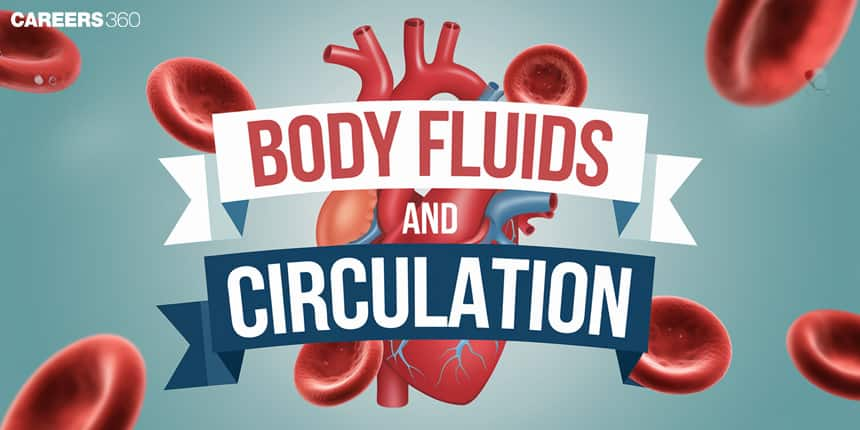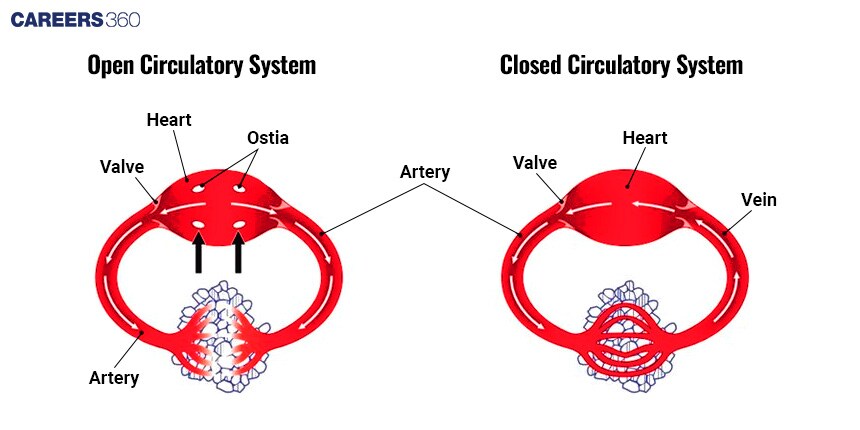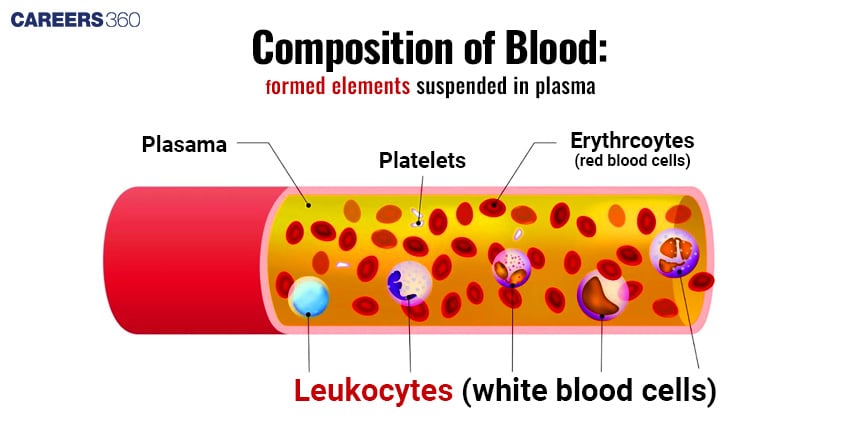Body Fluids and Circulation
Body Fluids and Circulation explains how the body transports nutrients, oxygen, and waste using fluids like blood and lymph. It includes the study of the heart, blood vessels, and how blood flows through the body. Understanding this is important for learning concepts in human physiology. This topic helps us understand how the body works and is important for learning biology and preparing for exams like NEET.
NEET 2025: Mock Test Series | Syllabus | High Scoring Topics | PYQs
NEET Important PYQ's Subject wise: Physics | Chemistry | Biology
New: Meet Careers360 B.Tech/NEET Experts in your City | Book your Seat now
- Important Topics of Chapter Body Fluids and Circulation
- Overview of the Chapter
- Types of Body fluids
- What is a Circulatory System?
- Blood Groups
- Human Circulatory System
- Disorders of the Circulatory System
- Tips, Tricks, and Strategies to Prepare For Body Fluids and Circulation
- Types of Questions and Weightage of Body Fluids and Circulation in Exams
- Prescribed Books for Body Fluids and Circulation

Important Topics of Chapter Body Fluids and Circulation
- Blood
- Human Lymphatic System
- Disorders of the Circulatory System
- Important Concepts - Double Circulation In Humans, Regulation of Cardiac Activity
Overview of the Chapter
Body fluids are the important body liquids that either circulate or are drained out from the body. There are two types, intracellular which is the fluid inside cells and extracellular, which contains lymph, blood plasma, and fluids surrounding organs. The main fluids in the body are blood, gastric juice, cerebrospinal fluid, saliva, semen, mucus, and urine, each of which has a distinct function, such as transportation, digestion, protection, or waste removal.
Also Read:
- Practice MCQ on Coronary Circulation
- Practice MCQ on Body Fluids
- Excretory Products and their Elimination
- Facts about Blood
Types of Body fluids
- Without a doubt, blood and lymph are the most important body fluids. Human blood is the fluid of connective tissue that includes white blood cells, red blood cells, plasma, and platelets.
- Due to the presence of haemoglobin, blood is usually red.
- Blood flows in two ways - from the heart to the muscle and from the muscles to the heart.
- Lymph, on the other hand, is a clear fluid that circulates within the lymphatic arteries and is also known as tissue fluid and interstitial fluid.
Functions of Body Fluids
These are among the few functions of body fluids.
- Transport of essential nutrients and oxygen to all vital organs.
- Removal of toxic waste.
- Body temperature control.
- Control of metabolism.
What is a Circulatory System?
The circulatory system forms it all. It's a means by which the body fluid is moved containing important substances like oxygen, nutrients, and waste around the body. Knowledge about constituents and functions of body fluids and circulatory systems is of the essence in maintaining health and identifying disorders associated with them.
Blood
- Blood is a specialized type of connective tissue. It is a strictly basic part of body fluid.
- Blood's chief functions include transportation, protection, and regulation.
Composition of Blood
Blood is composed of Plasma and formed elements
Plasma
Plasma represents the fluid part of the blood, it forms about 55% of the entire volume of blood. The prime content of the plasma is water. Besides that, it also contains proteins, electrolytes, nutrients, hormones, and waste products.
Formed Elements
The formed elements in blood are composed of erythrocytes, leucocytes, and platelets.
Erythrocytes
This is meant to carry oxygen from the place of loading, the lungs, to the different parts of the body and then return with the carbon dioxide to the lungs, which will then be exhaled.
Leucocytes
Popularly known as white blood cells, they form a part of the immune system, which fights various kinds of infections or diseases in the human body system.
Blood Platelets
These are small portions of cells whose responsibility is taking crucial clotting of blood and healing of wounds.
Blood Groups
Blood grouping becomes very important and relevant not only for safe blood transfusions but also for understanding the aspects of immune responses.
ABO Blood Group System
The ABO blood group system occurs in four different varieties or groups where the antigens of the red blood cells are distinguished A, B, AB, and O blood groups.
Rh Grouping
The Rh grouping is based upon either the presence or absence of an antigen known by the name Rh factor. According to the presence of this type of antigen, a person is Rh-positive or RH-negative.
Coagulation of Blood
Coagulation is a process during which blood vessels dilate and blood clots are formed, attempting to prevent the excessive loss of blood if a vessel is injured.
It is a complex cascade of events that results in the conversion of fibrinogen to fibrin, forming the meshwork of the clot.
Lymph
Lymph is the clear fluid moving through a lymph vessel, which belongs to the immune system.
It cleanses the tissues of waste and toxins or other debris with the transportation of WBCs in and out of the lymph nodes.
Circulatory Pathways
The two types of circulatory systems are open and closed.
Open Circulatory System
Blood is such that it does not always circulate within blood vessels. it flows freely off cavities, bathing organs directly.
Closed Circulatory System
Blood remains inside vessels, leading to further efficiency of substance transportation. The human circulatory system along with all other vertebrates works this way.

Human Circulatory System
The circulatory system of humans consists of the heart, the system of blood vessels, and blood.
Heart Structure
The heart is a muscular organ with a four-chambered structure, including two atria and two ventricles. It pumps the blood across the body parts.
Nodal Tissues
Various nodes and tissues present in the heart are the sinoatrial and atrioventricular nodes. These nodes give rise to impulses, which regulate the heartbeat.
Blood Vessels
Blood vessels are made up of arteries, veins, and capillaries. Blood leaves the heart through the arteries and returns to the heart through veins, in turn, the capillaries are the sites of delivery of material from the blood to the tissues and picking up material from the tissues.
Cardiac Cycle
It is the process of one heartbeat, involving contraction and relaxation, that continuously circulates the blood throughout the body.
Electrocardiogram ECG
- The ECG is a diagnostic method measuring the heart's electrical activity.
- It is useful in making various cardiac diagnoses and measures the rhythm of heartbeats in an individual.
Double Circulation
Double circulation is one of the features of the human circulatory system where the blood passes through the heart twice in one complete cycle. This consists of pulmonary and systemic circulations.
Pulmonary Circulation
It is the flow of blood from the heart to the lungs and backwards to the heart. This is the process by which blood gets oxygenated and carbon dioxide removed.
Systemic Circulation
The flow of oxygenated blood from the heart around the rest of the body and part deoxygenated blood back to the heart was another form of circulation.
Hepatic Portal System
Veins forming a system that carries blood from the gastrointestinal tract and spleen to the liver were used to have waste detoxified and nutrients processed.
Regulation of Cardiac Activity
The autonomic nervous system along with the endocrine system controls cardiac activity.
The sympathetic nervous system brings about an increase in heart rate, and the force of contraction, whereas the parasympathetic decreases heart rate.
Disorders of the Circulatory System
There could be different disorders of the circulatory system, thus hindering the path towards well-being.
Hypertension or High Blood Pressure
High blood pressure means the pressure of the blood up against the walls of the arteries is very strong. Hypertension increases the risk of heart disease and stroke.
Coronary Artery Disease (CAD)
It refers to the reduction or blockage of coronary arteries that supply blood to the heart muscle. Reduced blood supply to the heart makes the organ more prone to a heart attack.
Angina
Angina is a chest discomfort arising from poor blood circulation through the heart's muscles. It is mostly a symptom or sign of coronary heart disease.
Heart Failure
A condition in which the heart's function becomes unable to sufficiently meet the needs of the organs and tissues in the body. It results in symptoms such as shortness of breath, tiredness, and fluid retention.
Coronary Thrombosis
This is a blood clot inside one of the coronary arteries. Such thrombosis commonly leads to a heart attack.
Common NEET Questions on Body Fluids and Circulation
For NEET aspirants, it is very much necessary to master this chapter as it comes up many times in the NEET. Here are some of the question types:
Key Concepts | Details |
Body Fluids | Includes blood (plasma, RBCs, WBCs, platelets) and lymph. |
Circulatory Systems | Open: Blood flows freely in body cavities (e.g., insects). Closed: Blood circulates within vessels (e.g., humans). |
Blood Composition | Plasma, red blood cells (carry oxygen), white blood cells (immune response), and platelets (clotting). |
Types of Circulation | Systemic: Oxygenated blood to the body. Pulmonary: Deoxygenated blood to the lungs. |
Common Disorders | Hypertension and coronary heart disease. |
Body Fluids and Circulation MCQ
Those which come as multiple-choice questions and are meant for testing knowledge about blood components and circulation pathways. Here are some examples:
Question | Options | Correct Answer |
What type of tissue is blood? | 1. Loose connective tissue 2. Dense connective tissue 3. Mucoid connective tissue 4. Specialized connective tissue | 4. Specialized connective tissue |
Which component of blood is responsible for clotting? | 1. Plasma 2. Red Blood Cells 3. White Blood Cells 4. Platelets | 4. Platelets |
What is the primary function of red blood cells? | 1. Immune response 2. Transport oxygen 3. Clotting 4. Hormone transport | 2. Transport oxygen |
Which fluid helps in the removal of toxins from tissues? | 1. Blood 2. Lymph 3. Plasma 4. Interstitial fluid | 2. Lymph |
What kind of circulation do humans have? | 1. Open circulation 2. Single circulation 3. Double circulation 4. None of the above | 3. Double circulation |
Body Fluids and Circulation PYQ NEET
Previous year questions provide insight into the trend of examinations.
Here’s a table of Previous Year Questions (PYQ) from NEET related to Body Fluids and Circulation, formatted as multiple-choice questions (MCQs):
Year | Question | Options |
2016 | Name the blood cells whose reduction in number can cause clotting disorder, leading to excessive loss of blood. | (a) Erythrocytes (b) Leucocytes (c) Neutrophils (d) Thrombocytes |
2017 | The hepatic portal vein drains blood to the liver from which organ? | (a) Stomach (b) Kidneys (c) Intestine (d) Heart |
2018 | Which of the following is responsible for the transport of oxygen in the blood? | (a) Plasma (b) Hemoglobin (c) WBCs (d) Platelets |
2019 | What is the primary function of lymph? | (a) Transport nutrients (b) Immune response (c) Transport excess fluid (d) Clotting |
2020 | Which WBCs are involved in allergic reactions? | (a) Basophils (b) Eosinophils (c) Neutrophils (d) Monocytes |
2021 | What is the significance of double circulation in humans? | (a) Efficient oxygen transport (b) Single pathway (c) Reduced heart workload (d) None of the above |
2022 | The tricuspid and bicuspid valves open due to the pressure exerted by which of the following? | (a) Atria (b) Ventricles (c) Pulmonary artery (d) Aorta |
2023 | A unique vascular connection between the digestive tract and the liver is called? | (a) Hepatic portal circulation (b) Systemic circulation (c) Pulmonary circulation (d) Coronary circulation |
Tips, Tricks, and Strategies to Prepare For Body Fluids and Circulation
This table outlines important tips and tricks to master concepts related to body fluids and circulation in Class 11.
Tips/Tricks | Description |
Use Mnemonics | Create phrases to remember components of blood (e.g., "Red Blood Cells Carry Oxygen" for RBCs). |
Visual Aids | Utilize diagrams of the circulatory system to visualize pathways. |
Practice Past Papers | Solve previous years' questions (PYQ NEET) to familiarize yourself with exam patterns. |
Group Study | Discuss topics with peers to reinforce learning through teaching. |
Flashcards | Make flashcards for key terms and definitions related to body fluids. |
Types of Questions and Weightage of Body Fluids and Circulation in Exams
The table below indicates the weightage and types of questions asked on Body Fluids and Circulation in exams:
| Exam Type | Types of Questions | Weightage |
|---|---|---|
| CBSE | Short answer questions on blood composition, structure and function of the heart, circulation types, and lymphatic system. | 4-5% |
| MCQs cover blood groups, cardiac cycle, ECG, regulation of heart activity, and types of circulation (open, closed). | 3-4% | |
| AIIMS | Assertion and reason questions on blood pressure, heart regulation, and differences between systemic and pulmonary circulation. | 2-4% |
| Nursing Entrance Exams | Scenario-based questions on blood transfusion, circulatory system disorders, and the role of the lymphatic system in healthcare. | 2-3% |
| Paramedical Exams | True/False and MCQs on blood components, functions of the circulatory system, and basic cardiovascular physiology. | 1-3% |
Prescribed Books for Body Fluids and Circulation
The main and most recommended learning resource for Body Fluids and Circulation for Class 11 is the NCERT Biology textbook covering all concepts as adopted in the CBSE syllabus. For further understanding, "Trueman's Elementary Biology, Volume 1" can be referred to. The other useful book is "Pradeep's Biology" which is also known for its detailed explanation and plenty of solved examples. You can access a variety of videos, articles and mock tests on this chapter from the careers360 platform. These books along with proper practice will make a great package for board exams as well as competitive exams like NEET.
Also Read:
Recommended Videos on Body Fluids and Circulation
Frequently Asked Questions (FAQs)
Some functions are: -
Transport of essential nutrients and oxygen to all vital organs.
Removal of toxic waste.
Body temperature control.
Control of metabolism.
It ensures proper blood circulation inside the body without getting oxygen-rich blood mixed with deoxygenated.
In addition, the separation between the two types of blood even supplies oxygen to blood cells and increases the flow of blood.
Its major components include the heart, Blood, lungs, arteries, veins, capillaries, portal and coronary arteries.
The components of a blood component are as follows:
Erythrocytes or RBCs red blood cells - Carry oxygen and contain pigment.
Haemoglobin - Haemoglobin combines with its oxygen and forms Oxyhaemoglobin, which carries oxygen to the oxygen-deprived areas of the human body.
Leukocytes or WBCs or white blood cells - Lymphocytes are usually known to synthesise antibodies which reduce or kill germs. Neutrophils act as a defence against viruses known as phagocytosis.
Thrombocytes or platelets in the blood - help the blood to coagulate
Importance of some plasma proteins:
Globulins - Involved in the body's immune system, also called immunoglobulins
Albumins - help maintain the body's osmotic balance
Fibrinogens - play an important role in blood clotting
Common Diseases include hypertension, coronary artery disease, and heart failure. Management includes lifestyle changes concerning diet modification, routine exercise, and smoking cessation.
Blood typing is important in transfusion to ensure compatibility and prevent an immune reaction against the donor's antigens, which is made possible by the study of blood groups established by antigens on the surface of red blood cells.
Arteries are the blood vessels that move blood away from the heart, veins are the blood vessels that move blood back to the heart, and capillaries are the blood vessels that aid in the exchange of.
The cardiac cycle comprises regions of the systole, which is indicative of muscular contractions, and regions of the diastole, which is indicative of muscular relaxations. It is through the concomitant revolution of such muscular contractions and relaxations in the cardiac cycle that blood is pumped around the body. It is the nodal tissues which generate electrical impulses to regulate this process.
Also Read
29 Nov'24 01:19 PM
27 Nov'24 08:59 PM
27 Nov'24 07:39 PM
27 Nov'24 07:15 PM
27 Nov'24 05:11 PM
26 Nov'24 08:14 PM
26 Nov'24 06:50 PM
26 Nov'24 05:51 PM
26 Nov'24 04:44 PM
26 Nov'24 03:52 PM


